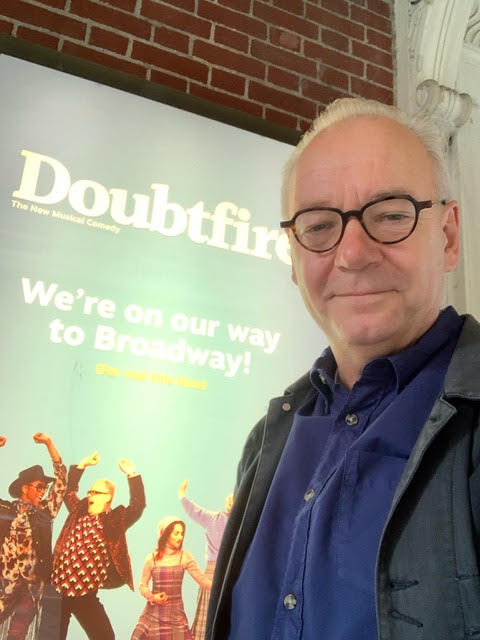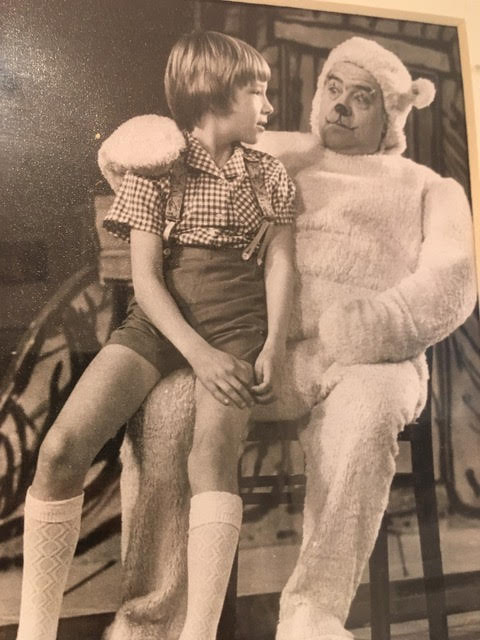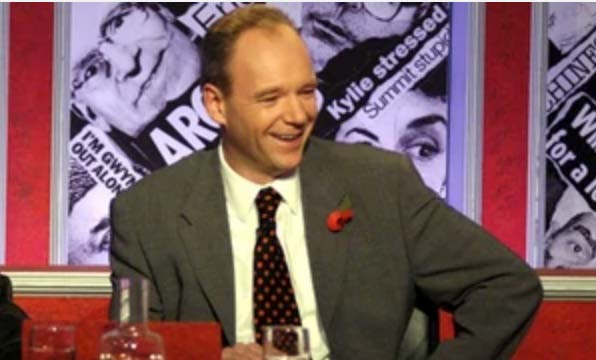In conversation with John O'Farrell
"Take the skills and experience you've learned at Redroofs, keep going with it to wherever you go next, and produce material. Don't sit around waiting for someone to discover you. Write stuff, be in stuff, turn up for stuff" - John O'Farrell, Author & Scriptwriter
 John in front of a poster for his second Broadway musical, Mrs Doubtfire.
John in front of a poster for his second Broadway musical, Mrs Doubtfire.
John O'Farrell is an award-winning author and comedy writer. He trained part-time at Redroofs from the age of eight to eighteen before studying English and Drama at the University of Exeter. To date, John has written many best selling books which have been adapted for television and radio, held a column in the Guardian, written for film and television projects including Chicken Run (Aardman) and Have I Got News For You (BBC), and co-written the book for two Broadway musicals (Something Rotten and Mrs Doubtfire), earning himself a Tony Award nomination.
John's impressive career shows no signs of slowing down. His latest musical, Mrs Doubtfire, is transferring from Broadway to the West End, opening at the Shaftesbury Theatre in May 2023, his latest film project, Chicken Run 2, is currently in production, and John is also co-host of the We Are History podcast alongside comedian Angela Barnes (The News Quiz, Mock the Week, Live at the Apollo). "I just recorded one [episode] before speaking to you now", he says.
On top of all these projects, he has a new novel coming out and is in the midst of writing his first ever straight play. "I've got a reading next month with some actors. And maybe that will die at the first reading or maybe it will have a trajectory beyond that. We'll wait and see. It's the first on spec writing I've done for 30 years, actually, so it's an interesting experiment".
'On spec' means that it hasn't been commissioned for anyone or any project in particular, but because John had a story he wanted to tell.
"They thought my improvisations were so funny that I should write for the top comedy show of the time. I ended up writing for those performers later in their career"
During his Redroofs days, John was a busy child actor landing roles in film, television, and in the West End. However he always had a particular knack for sketch comedy. "I always wanted to be a comedy writer and performer, I think, even at Redroofs", he says.
John remembers his Redroofs classmates telling him he should write for one of the big satirical television shows. "It made me so chuffed that they'd said that because that's exactly what I wanted to do", he reminisces. "They thought my improvisations were so funny that I should write for the top comedy show of the time. I ended up writing for those performers later in their career - for Mel Smith and Griff Rhys Jones - which was amazing".
John continued to work as a comedy writer for ten years. It was whilst working for BBC Radio that he met Mark Burton, who he went on to write Spitting Image, Have I Got News For You and other TV comedies alongside.
 John as Christopher Robin in Winnie the Pooh, West End (1972)
John as Christopher Robin in Winnie the Pooh, West End (1972)
Though John's career has been filled with incredible opportunities and experiences, the transition from university to the professional world was not easy.
"I didn't know how to get into the thing I wanted to do, and I wasn't convinced that I'd be ever allowed to do it", he begins. "Where do you apply to be a comedy writer? I didn't know how. I was sending off one sketch or one short story and waiting six months for it to come back, not realising that I could have sent it to ten people at once rather than wait for them one at a time".
He had been out of university for a few years before he had his first sketch performed on a TV show. John is now a mentor, helping other early-career writers push their work to the next level and break into the industry. "That's why mentoring is very good, to help young people guide themselves through these periods".
Offering insight for budding writers, he says, "They're not going to break into your house and find your unfinished script in a drawer. Give yourself the best chance by putting yourself under people's noses. It's a question of making yourself available and giving people the chance to give you a break".
"It's important to keep challenging yourself"
It was his books that made John O'Farrell a well-known name, and he suddenly found himself sitting on the TV panels rather than writing for them behind the scenes. "You're very special as a book writer. For years I wrote for TV, and I never would have been put in front of a TV camera. But then I wrote books and suddenly I was on News Night, Question Time... a Have I Got News For You panellist. I'd been a writer for Have I Got News For You, but they'd never have put me in the chair", he says. "My books had given me a status. It's funny how different sorts of writing comes with different statuses attached".
 John on the panel of the TV show, Have I Got News For You.
John on the panel of the TV show, Have I Got News For You.
John has continued to author book after book, but he has also pushed himself in other styles of writing, and to great success. "I've written just for just about every genre there is, apart from Opera!", he laughs.
"As a writer it's important to keep challenging yourself, and not to settle into reproducing one successful project you had years back. So I've tried to do different things and challenge myself and learn new things. To have been in my 50s before I started my first musical was an exciting challenge", John begins.
"To be on a steep learning curve in the middle of my life was was amazing, really. To be working with actors and so many talented people and learning new things was very stimulating, and that's what makes work interesting".
With experience across many genres of writing, John shares an insight into how each discipline differs.
"On a film you're the writer, but somebody else is the director, the actor will interpret it, the editor will chop it down, somebody else does the lighting, the sound, the music. It's very collaborative, but you're not in control. In my books, I am the lighting designer, I am the director, I am the actor, I'm everything. And I do like that, but it's a lonely business", he explains.
"So I like the opportunity to jump between the two, to go from writing on my own to writing in teams and being in rehearsals and discussing stuff with actors. Actors, good actors, have smart things to say. They pull you up on things that you've overlooked or presumed and make you think about things a little bit harder".
"Be amenable, take criticism, keep taking notes, and don't be someone who's difficult"
With many years of experience, John has some invaluable advice for those keen to carve out their own writing career. "If you are working on something, be amenable, take criticism, keep taking notes, and don't be someone who's difficult because they won't want to work with you again", he says. "It's one thing to learn stagecraft and all the other things, but just be a nice person who people want to work with, because that counts for an awful lot".
As for how to hone your skills, there's only one thing for it: "Just keep writing. Keep turning up at the page. There is no such thing as waiting for inspiration. You have to walk into that dark room, not knowing where anything is, and just wait for your eyes to adjust", he says. "Every morning I feel like I'm learning to write all over again"
 John's first memoir, Things Can Only Get Better (adapted for BBC Radio) & third novel, May Contain Nuts (adapted for ITV)
John's first memoir, Things Can Only Get Better (adapted for BBC Radio) & third novel, May Contain Nuts (adapted for ITV)
"Every first draft is not very good, but it gets better. It's a journey. It's a long walk to write a big play or a novel or a screenplay, but it gets better and better the more time you spend on it".
John suggests exercises, such as writing a 1000 word story in a day, to keep improving. "If you write that in a day that's an a huge achievement, and you'll have something that you didn't have at the beginning of the day", he says. "You get better by turning up and just doing it and doing it and doing it".
"Don't wait for inspiration. Don't use research as avoidance. You can use research when you know what it is you're researching. Just write".
Collaboration is another method that John vouches for. "It doesn't have to be all your projects, but you might do it with one project and learn a lot from that. That's something I did very early on and it gave me a lot of confidence. Confidence is a huge hurdle, to believe that the stuff you are writing is good".
"Being creative doesn't mean feeling creative, it means actually creating things"
Once the boy improvising comedy sketches at Redroofs' Littlewick Green to the criticallyacclaimed author and scriptwriter, John offers current Redroofians his advice: "You're in a good place at the moment where you have the opportunity to try things out. Remember, you're part of a team; it's about supporting each other and creating space for other people to be creative in different ways to how you might want to express yourself.
"Take the skills and experience you've learned at Redroofs, keep going with it to wherever you go next, and produce material. Don't sit around waiting for someone to discover you. Write stuff, be in stuff, turn up for stuff".
John's parting words of wisdom are applicable to anyone with passions in writing, acting, dancing, filmmaking, painting or anywhere else within the creative universe; "Just give yourself the best chance of being spotted, or learning things yourself through the action of being creative, because being creative doesn't mean feeling creative, it means actually creating things".